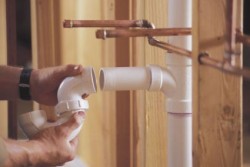
Aside from being expensive to repair, burst pipes make a lot of mess and can cause considerable water damage inside your home.
When water standing within plumbing lines freeze, they cut off your water supply and run the risk of bursting. Boston plumbing company experts disclose that most home insurance claims involve burst frozen pipes. Aside from being expensive to repair, burst pipes make a lot of mess and can cause considerable water damage inside your home. Frozen water pipes can be avoided if you take some simple steps when winter temperatures reach its low points. Read this post for some advice provided by Houston plumbing company experts on avoiding frozen water pipes.
To prevent outdoor water pipes from freezing, insulate them with a cover fashioned from a thermal blanket. Simply measure the length of each line and cut twice the length from a thermal blanket. Soak the cut thermal material in hot water and wrap it two layers thick around each pipe. With duct tape, secure the blanket at the top and bottom so that it fits snugly.
For indoor water pipes, you can use a space heater or a heat lamp to keep the pipes from freezing. An electric space heater on a low setting would be sufficient to keep the water pipes warmed. You can also utilize a desk lamp with an adjustable neck if no other option is available. Simply position the desk lamp so that it is very close to the pipe surface but not touching it.
When you know that the temperature will be significantly below freezing, allow all faucets throughout the house to drip slightly. When water is allowed to continue flowing in the pipes (even if slowly) it does not get a chance to freeze.
One sure-fire method of preventing frozen water pipes is to use electrical heat tapes. Electrical heat tapes wrap around exposed water lines and left in place all throughout the winter. They can be turned on to keep water pipes warm during below zero temperatures and unplugged when not needed. Electrical heat tapes are also very useful when thawing frozen water lines.
















